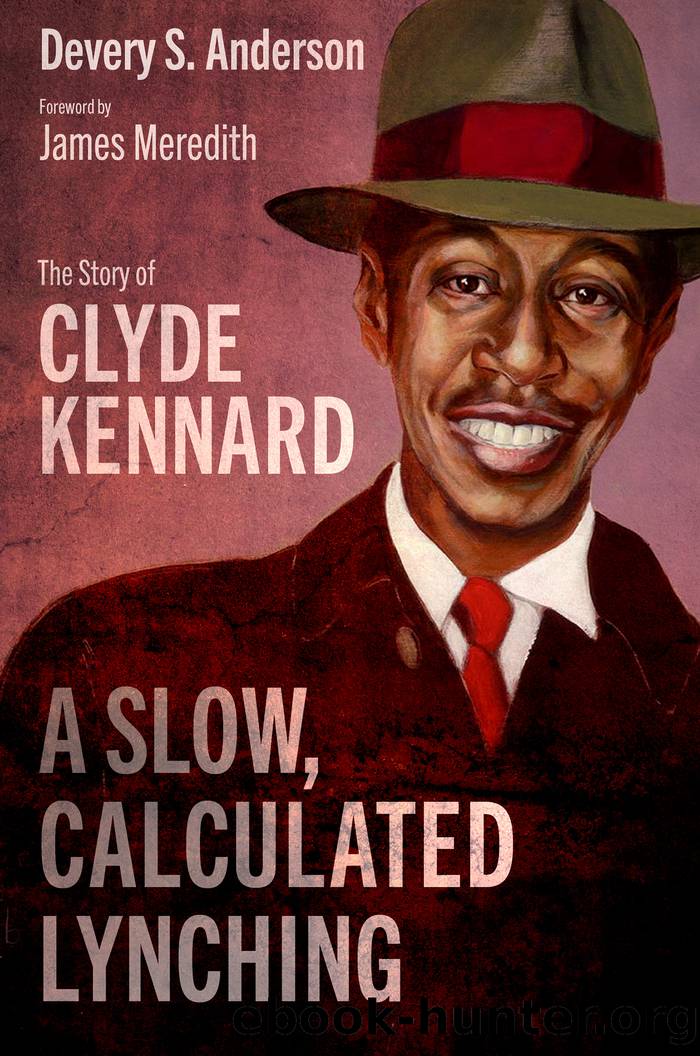A Slow, Calculated Lynching by Devery S. Anderson

Author:Devery S. Anderson
Language: eng
Format: epub
Publisher: University Press of Mississippi
Published: 2023-08-15T00:00:00+00:00
10.
âMARTYRDOMâ
Clyde Kennard was one of the great men of our times. He is known by very few, and yet no less a person than Jacques Maritain, the renowned French philosopher, described him this way: âI have no doubt that Clyde Kennardâs life and martyrdom are among the most significant events of our age.â
âJohn Howard Griffin, âRequiem for a Martyrâ
Students at Tougaloo College, a historically Black school just north of Jackson, began doing their part to free Clyde Kennard, and like many of those who read about the case in The Reporter, they aimed to send a message directly to President Kennedy. Twenty-year-old Dorie Ladner took the lead in organizing a signature drive on a petition directed at the White House. Ladner, a Hattiesburg native, had known Kennard since she was a young teen. In fact, Ron Hollander reached out to her while he was in Hattiesburg the summer before. She described Kennard as âquiet, serious, bright; not for good times.â He was also âeasy to get along with. Stuck to himself, tended his business.â She believed that if Kennard ever got out of prison, heâd try again to get into the college, attributing that to his âstrong convictions.â Years earlier, he advised her and her sister Joyce to make sure they earned an education, and he even helped them with their classwork. Kennard âmade us aware of what was going on,â she said.1
Ladner asked students to cut the form out of the paper, obtain the ten signatures on the lines the petition provided, and send them directly to President Kennedy. She also asked them to supply copies to church, union, and community groups they affiliated with throughout the country in this massive drive to free Kennard. âTo some of us, he is a personal friend,â wrote Ladner in her appeal. âTo others, a symbol; to all, a fellow human unjustly accusedâ¦. We appeal to you to join with us that together, we may be heard ⦠and that justice may prevail.â2
The five-paragraph petition maintained that Kennard had been framed for the crime he had been convicted of, that âNegroes are systematically excluded from registering to vote in Forrest County, the scene of the trial,â and that âby convicting Clyde Kennard, the State of Mississippi has made a successful and unveiled attempt to persecute him for applying to Mississippi Southern University.â3
The Mississippi Free Press ran an article about the drive in its December 22 issue. Staff there still knew nothing about Kennardâs cancer, and the article said only that Kennard had been suffering from a mysterious anemic condition he had developed while serving in Korea and that he had undergone blood transfusions. Whatever it was that ailed him, the article noted, Kennard had been denied any leniency or sympathy at the prison. âThe state has announced that the time spent in the hospital will not be credited to his sentence,â it concluded. If that was indeed true it would have been an unusual move because hospital stays were routinely counted toward any time that inmates had left to serve.
Download
This site does not store any files on its server. We only index and link to content provided by other sites. Please contact the content providers to delete copyright contents if any and email us, we'll remove relevant links or contents immediately.
Down the Drain by Julia Fox(963)
The Light We Carry by Michelle Obama(879)
Cher by Cher(788)
Simple Passion by Annie Ernaux(735)
Love, Pamela by Pamela Anderson(594)
Zen Under Fire by Marianne Elliott(556)
You're That Bitch by Bretman Rock(540)
The Nazis Knew My Name by Magda Hellinger & Maya Lee(539)
Novelist as a Vocation by Haruki Murakami(529)
The Foxfire Book of Appalachian Women by Kami Ahrens(518)
Alone Together: Sailing Solo to Hawaii and Beyond by Christian Williams(514)
Kamala Harris by Chidanand Rajghatta(490)
Gambling Man by Lionel Barber(469)
The Barn by Wright Thompson(428)
Drinking Games by Sarah Levy(415)
Limitless by Mallory Weggemann(409)
A Renaissance of Our Own by Rachel E. Cargle(405)
Memoirs of an Indian Woman by Shudha Mazumdar Geraldine Hancock Forbes(402)
A new method to evaluate the dose-effect relationship of a TCM formula Gegen Qinlian Decoction: âFocusâ mode of integrated biomarkers by unknow(396)
